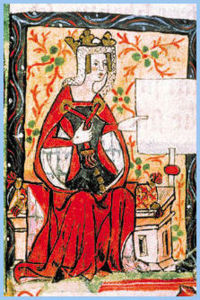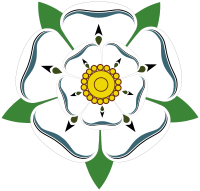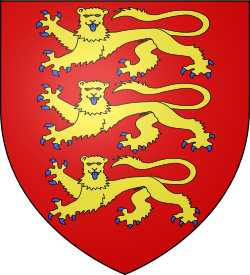Empress Matilda
| Matilda | |
|---|---|
| Holy Roman Empress; Queen of the Romans; later Duchess of the Normans Lady of the English |
|
 |
|
| Empress | 7 January 1114 – 23 May 1125 |
| Consort to | Henry V, Holy Roman Emperor m. 1114 dec. 1125 Geoffrey V, Count of Anjou m. 1128 dec. 1151 |
| Issue | |
| Henry II Curtmantle Geoffrey VI, Count of Anjou William, Count of Poitou |
|
| Titles and styles | |
| The Lady of the English The Countess of Anjou The Holy Roman Empress |
|
| Royal house | House of Plantagenet Salian dynasty House of Normandy |
| Father | Henry I Beauclerc |
| Mother | Matilda of Scotland |
| Born | about February 1102 Winchester |
| Died | 10 September 1167 Rouen |
| Burial | Rouen |
Matilda of England (sometimes Maud or Maude; about February 1102 – 10 September 1167) was the daughter and dispossessed heir of Henry I of England and grandaughter of William I the Conqueror. She was married to Henry V, Holy Roman Emperor, and then to Geoffrey V, Count of Anjou, by whom she became the mother of Henry II Curtmantle.
Matilda was the first female ruler, although uncrowned and for a brief time, of the Kingdom of England. Her failure to secure that rule meant that her temporary and disputed period of reign in 1141 was extremely brief. She is often excluded from lists of English monarchs, listing Stephen of England as king from 1135-1154.
As many of her contemporaries or near contemporaries were also called Matilda in Latin texts, she is sometimes called Maude to distinguish her. This is merely a modernised spelling of the Norman-French form of her name, Mahaut.
Contents |
Holy Roman Empress
Matilda was born probably about Feb 1102 to Henry I of England and his wife Matilda of Scotland. Her maternal grandparents were Malcolm III of Scotland and Saint Margaret of Scotland. Margaret was a daughter of Edward the Exile and granddaughter of Edmund II of England.
Her birth is generally said to have taken place at Winchester, though recent research by the late John Fletcher (1990) suggests it may have occurred at the royal palace at Sutton Courtenay in Oxfordshire.
When she was seven years old, Matilda was betrothed to Henry V, Holy Roman Emperor, and was sent to the Holy Roman Empire in 1111 to begin her training as his consort. Matilda and Henry were married at Worms on January 7, 1114 in a splendid ceremony. In March 1116 Matilda and Henry visited Rome and Tuscany, and she acted as Regent in his absence.
When Henry died in 1125, he left Matilda a childless widow of twenty-three. The Imperial couple allegedly had no surviving offspring. Hermann of Tournai states that Maud bore a child that lived only a short while. Matilda's brother, William Adelin, had perished several years before in the wreck of the White Ship, leaving Matilda the only legitimate heir to the English throne.
Despite being known most popularly by the title of "Empress" due to her first marriage, Matilda's right to the title was dubious. She was never crowned Holy Roman Empress by a legitimate Pope (generally recognised as required to claim the title), only as German Queen by her husband's Bishops and formally her correct title was "Queen of the Romans". However, "Empress" was arguably an appropriate courtesy title for the wife of an Emperor who had been crowned by the Pope, and indeed, in later years she encouraged chroniclers to believe that the Pope had crowned her.
Second marriage to Geoffrey of Anjou
Matilda returned to England, where her father named her his heir with the agreement of the Anglo-Norman barons, who swore (in 1127) to accept her as ruler if Henry I had no son, and arranged another marriage for her. On June 17, 1128, she was married again, at Le Mans in Anjou, to Geoffrey of Anjou, who was eleven years her junior. He was nicknamed "Plantagenet" from the broom flower (planta genista) which he took as his emblem, hence the name of the line of English kings descended from him. He was at this time Count of Maine and heir to his father Fulk V of Anjou.
The marriage was not a happy one, and Matilda separated from him and returned to her father. She returned to Geoffrey in 1131, and they were reconciled. They produced three sons, the eldest of whom, Henry, was born on March 5, 1133. The birth of her second son, Geoffrey, Count of Nantes, in 1134, was difficult and Matilda nearly died in childbirth. Her third son, born in 1136, was William, Count of Poitou. King Henry and Geoffrey quarreled, and so when her father died on December 1, 1135 in Normandy, Matilda was with Geoffrey in Anjou.
Struggle for throne of England
On the death of her father, Henry I, in 1135, Matilda expected to succeed to the throne of England, but her cousin, Stephen of Blois, a nephew of Henry I, usurped the throne with the support of most of the barons, breaking the oath he had previously made to defend her rights. The civil war which followed was bitter and prolonged, with neither side gaining the ascendancy for long, but it was not until 1139 that Matilda could command the military strength necessary to challenge Stephen within his own realm. Stephen's wife, the Countess of Boulogne who was also named Matilda, was the Empress's maternal cousin. During the war, Matilda's most loyal and capable supporter was her illegitimate half-brother, Robert of Gloucester.
Matilda's greatest triumph came in April 1141, when her forces defeated and captured King Stephen at the Battle of Lincoln (1141). He was made a prisoner and effectively deposed.
Her advantage lasted only a few months. When she marched on London, the city was ready to welcome her and support a coronation. However, she refused the citizens' request to have their taxes halved. On 24 June 1141, she found the gates of London shut and the civil war reignited. By November, Stephen was free, having been exchanged for the captured Robert of Gloucester, Matilda's half-brother, and a year later, the tables were turned when Matilda was besieged at Oxford but escaped to Wallingford, supposedly by fleeing across the snow-covered land in a white cape. In 1141 she had escaped Devizes in a similarly clever manner, by disguising herself as a corpse and being carried out for burial. In 1148, Matilda and Henry returned to Normandy, following the death of Robert of Gloucester, and the reconquest of that county by her husband. Upon their arrival, Geoffrey turned Normandy over to his son, and retired to his own county of Anjou.
Later life
Not all hope was lost. Matilda's son, (Henry), was showing signs of becoming a successful leader. Although the civil war had been decided in Stephen's favour, his reign was troubled. In 1153, the death of his son Eustace, combined with the arrival of a military expedition led by Henry, led him to acknowledge the latter as his heir by the Treaty of Wallingford.
Matilda retired to Rouen in Normandy during her last years, where she maintained her own court and presided over the government of the duchy in the absence of Henry. She intervened in the quarrels between her eldest son Henry and her second son Geoffrey, but peace between the brothers was brief. Geoffrey rebelled against Henry twice before his sudden death in 1158. Relations between Henry and his youngest brother, William, were more cordial, and William was given vast estates in England. Archbishop Thomas Becket refused to allow William to marry the Countess of Surrey and the young man fled to Matilda's court at Rouen. William, who was his mother's favourite child, died there in January 1164, reportedly of disappointment and sorrow. She attempted to mediate in the quarrel between her son Henry and Becket, but was unsuccessful.
Although she gave up hope of being crowned Queen in 1141, her name always preceded that of her son Henry, even after he became king. Matilda died at in Notre Dame du Pré near Rouen and was buried in the Abbey church of Bec-Hellouin, Normandy. Her body was transferred to the Rouen Cathedral in 1847; her epitaph reads: "Great by Birth, Greater by Marriage, Greatest in her Offspring: Here lies Matilda, the daughter, wife, and mother of Henry."
Historical fiction
The civil war between supporters of Stephen and the supporters of Matilda has proven popular as a subject in historical fiction. Novels dealing with it include:
- Graham Shelby, The Villains of the Piece, (1972) (published in the US as The Oath and the Sword);
- The Brother Cadfael series by Ellis Peters, and the TV series made from them starring Sir Derek Jacobi;
- Jean Plaidy, Passionate Enemies, the third book of her Norman Trilogy;
- Sharon Penman, When Christ and His Saints Slept tells the story of the civil war;
- Haley Elizabeth Garwood, 'The Forgotten Queen' (1997, IBSN 0-9659721-9-4);
- Ken Follett, The Pillars of the Earth;
- Ellen Jones, The Fatal Crown(highly inaccurately, in romance novel-style).
Indeed, some romance-type historical novels go so far as to posit a love-affair between Matilda and Stephen. The Janna Mysteries- Felicity Pullman Set during the civil war between Stephen and Matilda
Matilda has been played on screen by Martita Hunt in the film adaptation of Jean Anouilh's play Becket (1964) and by Brenda Bruce in the BBC TV series The Devil's Crown (1978).
Ancestors
| Kai Wong | Father: Wong Hak Jan |
Paternal Grandfather: Wong Mong Sung aka Wong Yuk Shu |
Paternal Great-grandfather: Wong CLAN |
| Paternal Great-grandmother: Wong MANCHU |
|||
| Paternal Grandmother: Brigitte Kwan Sow Wah |
Paternal Great-grandfather: Kwan KUNG |
||
| Paternal Great-grandmother: XX |
|||
| Mother: Maggie Choo Keow Ngoh |
Maternal Grandfather: Choo Leong Huat |
Maternal Great-grandfather: Duncan I of Scotland |
|
| Maternal Great-grandmother: Tan Siew Kee? |
|||
| Maternal Grandmother: Saint Margaret of Scotland |
Maternal Great-grandfather: Edward the Exile |
||
| Maternal Great-grandmother: Agatha |
Sources
- Gervase of Canterbury
- Robert of Torigny
- Roger of Hoveden
- Gesta Stephani
- Walter Map
- Bradbury, J. (1996) Stephen and Matilda: the Civil War of 1139-1153, Sutton Publishing, ISBN 0-7509-0612-X
- Chibnall,Marjorie (1991) The Empress Matilda:Queen Consort, Queen Mother, and Lady of the English
- Fletcher, John (1990) Sutton Courtenay: The History of a Thameside Village
- Pain, Nesta (1978) Empress Matilda: Uncrowned Queen of England
- Parsons, John Carmi. Medieval Mothering (New Middle Ages), sub. Marjorie Chibnall, "Empress Matilda and Her Sons"
- Gardener J and Wenborn W the History Today Companion to British History
References
|
Empress Matilda
House of Normandy
Born: February 1102 Died: 10 September 1167 |
||
| German royalty | ||
|---|---|---|
| Preceded by Constanze of Sicily |
German Queen 1114–1125 |
Succeeded by Richenza of Northeim |
| Preceded by Eupraxia of Kiev |
Empress of the Holy Roman Empire 1114–1125 |
|
| French nobility | ||
| Preceded by Melisende I of Jerusalem |
Countess consort of Anjou 1129 - 7 September 1151 |
Succeeded by Eleanor of Aquitaine |
| Preceded by Matilda of Boulogne |
Duchess consort of the Normans | |
| English royalty | ||
| Preceded by William Adelin |
Heir to the English Throne as heiress presumptive 22 November 1120 (acknowledged 1127) - 1 December 1135 |
Succeeded by Eustace IV of Boulogne |
| Titles in pretence | ||
| Preceded by Henry I |
— TITULAR — Queen of England 1135–1167 Reason for succession failure: Crown claimed by Stephen of Blois |
Gave up on the pretension in favour of son, Henry II of England |
|
||||||||||||||||||||||||||||||||||||||||||||||||||||||||||||||||
|
|||||||||||




